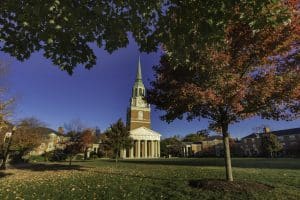Wake Forest Supplemental Essays 2023-2024
Wake Forest University’s supplemental essays for 2023-2024 are key to the college application process, offering insight into an applicant’s personality and fit for the university. These essays are more than a display of writing skills; they’re a chance for students to share their unique stories and aspirations. In a competitive academic environment, these essays can significantly impact admissions decisions.
To effectively approach these essays, students need thoughtful preparation and a strategic mindset. It’s essential to engage in self-reflection, understand Wake Forest’s ethos, and craft narratives that are engaging and revealing, ultimately aligning with the university’s values and expectations.
The supplemental essay prompts at Wake Forest are designed to reflect the university’s culture and values. Responding to these prompts requires not just answers but an understanding of Wake Forest’s ideals. This article guides mastering these essays for the 2023-2024 cycle, offering strategies to interpret prompts, infuse personal insights, and create compelling narratives that showcase why you’re an ideal fit for Wake Forest University.
How Many Supplemental Essays Does Wake Forest Have?
For the 2023-24 application cycle, Wake Forest University has outlined a set of supplemental essays as part of their admissions process. Applicants are required to complete one mandatory essay prompt, which seeks to understand their motivation for applying to Wake Forest. In this required essay, applicants should elaborate on any aspects that have drawn their interest towards the university, with a word limit of 150 words.
In addition to the required essay, there are four optional essays. Although these are not mandatory, Wake Forest strongly recommends that applicants submit these additional essays. This recommendation stems from the desire of admissions officers to gain a more comprehensive understanding of the applicants and their keen interest in the university.
The optional essays cover a range of topics, including a list of five intriguing books read by the applicant, a discussion on what piques their intellectual curiosity, a reflection on a quote by Dr. Maya Angelou and its relevance to their life or potential contribution to the Wake Forest community, and a “Top Ten” list on a theme of the applicant’s choosing.
The word limits for these essays vary, with one of the prompts requiring a 300-word response, while others are limited to 150 words.
These supplemental essays play a significant role in the admissions process at Wake Forest University. With numerous applicants possessing similar academic profiles, these essays provide a unique opportunity for students to distinguish themselves and demonstrate their full interest in the institution.
What are the 2023-2024 Wake Forest Supplemental Essays?
Prompt #1
Why have you decided to apply to Wake Forest? Share with us anything that has made you interested in our institution. (150 words)
Prompt #2
We welcome the opportunity to get to know you beyond the numbers. You are invited to answer any, all, or none of the following optional short-response questions.
- List five books you’ve read that intrigued you. (150 characters)
- Tell us what piques your intellectual curiosity or has helped you understand the world’s complexity. This can include a work you’ve read, a project you’ve completed for a class, and even co-curricular activities in which you have been involved. (150 words)
- Dr. Maya Angelou, renowned author, poet, civil-rights activist, and former Wake Forest University Reynolds Professor of American Studies, inspired others to celebrate their identities and to honor each person’s dignity. Choose one of Dr. Angelou’s powerful quotes. How does this quote relate to your lived experience or reflect how you plan to contribute to the Wake Forest community? (300 words)
- Give us your Top Ten list. (The choice of theme is yours.) (100 characters)
How to Write the 2023-2024 Wake Forest Supplemental Essays
Question #1
Why have you decided to apply to Wake Forest? Share with us anything that has made you interested in our institution. (150 words)
This prompt, with a 150-word limit, invites you to share why you’re interested in studying at Wake Forest University. It’s a chance for you to highlight what specific aspects of the university appeal to you the most. In your response, you can discuss anything from academic programs to campus life that makes Wake Forest stand out to you. Think of this as an opportunity to show the admissions committee how Wake Forest aligns with your educational and personal goals. Here’s how you should approach this prompt:
1. Personal Connection to the University: Encourage students to reflect on any personal connections they have with Wake Forest. This could be a family legacy, a visit to the campus that left a strong impression, or a specific encounter or conversation with current students or alumni. They should explain how these connections made them feel and why they were impactful.
2. Academic Programs and Opportunities: Students should research and mention specific academic programs, courses, or unique educational opportunities at Wake Forest that align with their academic interests and career goals. They should delve into why these programs appeal to them, perhaps linking them to past academic or extracurricular experiences, and how they see themselves benefiting from and contributing to these programs.
3. Campus Culture and Community: Here, the focus is on Wake Forest’s campus culture, values, and community spirit. Students should think about what aspects of Wake Forest’s community culture (such as its emphasis on service, diversity, innovation, etc.) resonate with them. They can talk about how they see themselves fitting into and enhancing this community based on their own values and experiences.
4. Personal and Professional Growth: Students should consider how attending Wake Forest will aid in their personal and professional development. This could include discussing how the university’s ethos, resources, or network will help them achieve their long-term goals. They should be specific about how Wake Forest’s unique offerings will support their journey toward personal growth and career aspirations.
In each of these points, it’s crucial that students provide specific, personal, and thoughtful reflections. The aim is to show a deep and genuine interest in Wake Forest, going beyond generic statements. Their response should reflect a clear understanding of what Wake Forest offers and how it aligns with their own aspirations and values.
Question #2-A
List five books you’ve read that intrigued you. (150 characters)
The prompt “List five books you’ve read that intrigued you” is straightforward but reveals a lot about a student’s interests, intellectual curiosity, and personality. Here’s a detailed breakdown of how a student can approach this prompt:
1. Reflect on Personal Interests and Growth: The books a student chooses should reflect their genuine interests, passions, or moments of personal growth. They should consider books that left a significant impact on their thinking or that resonate with their personal journey. For instance, a book that introduced them to a new perspective, deepened their understanding of a subject they are passionate about, or a novel that provided comfort during a challenging time. This reflection not only helps in selecting books but also prepares the student to explain their choices if elaboration is required in later essays or interviews.
2. Diversity in Selections: The selection should ideally encompass a variety of genres, subjects, and authors. This diversity demonstrates intellectual curiosity and a willingness to explore different ideas and cultures. For example, mixing classic literature with contemporary novels, non-fiction works, and perhaps books in their field of academic interest (like a popular science book for a STEM student) shows a well-rounded reading habit.
3. Consider the Implications of Each Choice: Each book listed says something about the student. For example, choosing a book about social justice might suggest a concern for societal issues, while a science fiction novel might indicate a creative and futuristic mindset. Students should be mindful of what each book might imply about their character, values, and interests.
4. Avoid Overthinking ‘Right’ Choices: Students often fall into the trap of trying to guess what the admissions committee might find impressive. It’s important to avoid this and focus on authenticity. Authentic choices that genuinely intrigue the student are more likely to resonate with the reader. Authenticity in their choices can also make it easier for them to discuss these books passionately if asked in an interview or follow-up essay.
Students should use this prompt as an opportunity to showcase their unique identity, intellectual depth, and the breadth of their interests through their choice of books. This approach not only answers the question effectively but also adds a personal dimension to their application.
Question #2-B
Tell us what piques your intellectual curiosity or has helped you understand the world’s complexity. This can include a work you’ve read, a project you’ve completed for a class, and even co-curricular activities in which you have been involved. (150 words)
This essay prompt is about understanding what drives a student’s intellectual curiosity or has helped them grasp the complexity of the world. It’s an opportunity for students to showcase their interests, how they engage with the world intellectually, and what experiences have shaped their understanding. Here are four key points to consider when answering this prompt:
1. Identify a Specific Interest or Experience: Choose a topic that genuinely excites you, whether it’s a book, a project, or an extracurricular activity. The key is to be specific. For instance, instead of saying you love science, you might talk about how a particular experiment in chemistry class deepened your understanding of reaction kinetics.
2. Demonstrate Personal Growth or Insight: Explain how this interest or experience contributed to your understanding of a complex topic or issue. Did it challenge your beliefs or change your perspective? For example, if you read a novel about a culture different from your own, discuss how it broadened your understanding of global issues.
3. Link to Academic or Career Goals: If possible, connect this interest or experience to your future academic or career aspirations. This shows that your curiosity is not just a passing interest but something that is guiding your educational journey. For instance, a student interested in environmental science might talk about how a project on renewable energy sources influenced their decision to pursue this field.
4. Reflect on the Importance of Curiosity and Learning: Finally, reflect on the broader importance of being intellectually curious and open to learning. This might involve discussing how your chosen interest or experience has equipped you with skills or knowledge that you believe are essential for success in college and beyond.
Remember, the essay is short (150 words), so you’ll need to be concise and direct in your writing. Focus on showing depth in a single area rather than trying to cover too many topics superficially.
Question #2-C
Maya Angelou, renowned author, poet, civil-rights activist, and former Wake Forest University Reynolds Professor of American Studies, inspired others to celebrate their identities and to honor each person’s dignity. Choose one of Dr. Angelou’s powerful quotes. How does this quote relate to your lived experience or reflect how you plan to contribute to the Wake Forest community? (300 words)
The prompt you’ve provided is centered around the influence of Maya Angelou’s work and its relevance to personal identity, dignity, and community contribution. Here are four key points for students to consider when brainstorming their responses:
1. Understanding Maya Angelou’s Quotes: Before choosing a quote, it’s crucial for the student to delve into Maya Angelou’s vast collection of work. Angelou’s quotes often reflect themes of resilience, human dignity, courage, and the celebration of diversity. The student should look for a quote that resonates with them on a personal level. This requires reflecting on their own experiences, values, and beliefs. The chosen quote should ideally be a mirror that reflects a part of their identity or life philosophy.
2. Personal Connection: Once a quote is selected, the student should introspectively explore how this quote relates to their own life. This could be through a personal experience, a challenge they’ve overcome, or how the quote has shaped their perspective on life. It’s important to share a genuine, personal story or reflection that brings the quote to life. The aim is to show how Angelou’s words have been internalized or manifested in their own journey.
3. Reflection on Identity and Dignity: Considering Angelou’s focus on identity and dignity, the student should discuss how the quote has influenced their understanding and appreciation of these concepts. This part of the essay can explore themes of self-awareness, cultural background, personal growth, or how they respect and acknowledge the dignity of others. It’s about demonstrating a deep engagement with Angelou’s ideas and how they intertwine with the student’s own sense of self and respect for others.
4. Contribution to Wake Forest Community: Finally, the student should articulate how the insights gained from Angelou’s quote will influence their contributions to the Wake Forest community. This involves envisioning how their personal experiences and lessons learned can be applied in a community setting.
It could be through specific initiatives, fostering inclusive environments, or how they plan to engage with and learn from others. The goal is to illustrate a forward-looking approach, showing how their unique perspective and experiences will enrich the campus community.
Overall, the student should aim to create a narrative that’s reflective, insightful, and demonstrates a deep engagement with Maya Angelou’s teachings, while also showcasing their unique personality and aspirations for their time at Wake Forest University.
Question #2-D
Give us your Top Ten list. (The choice of theme is yours.) (100 characters)
The “Top Ten list” prompt is quite intriguing and open-ended. It’s designed to gauge a student’s creativity, personal interests, and ability to engage with an unconventional essay format. The prompt is less about the content of the list and more about what the list reveals about the student. Here’s how a student might approach this prompt:
1. Selecting a Unique Theme: The theme choice is crucial as it reflects the student’s personality, interests, or experiences. For instance, a student passionate about environmental issues might choose “Top Ten Ways to Live Sustainably,” while someone interested in literature might opt for “Top Ten Literary Characters Who Influenced Me.” The key is to pick a theme that is personal and meaningful, offering insight into the student’s world view, values, or aspirations.
2. Showcasing Depth and Insight: Each item on the list should provide more than just a name or a title; it should include a brief explanation that offers depth and insight. For example, if a student lists a historical figure, they could mention how that person’s achievements or ethics inspired them. This approach demonstrates critical thinking and the ability to find inspiration in diverse places.
3. Balancing Seriousness and Playfulness: The list format allows for a mix of seriousness and playfulness. Students could balance light-hearted items with more profound ones. This juxtaposition can create an engaging, dynamic read, showing the admissions committee that the student is well-rounded, reflective, and can appreciate different aspects of life.
4. Reflecting Personal Growth or Aspirations: The list can be a vehicle to discuss personal growth or future aspirations. For example, a student interested in a medical career might list “Top Ten Medical Innovations That Fascinate Me,” briefly explaining how each innovation inspires them and relates to their future goals. This approach not only showcases the student’s interest in the field but also their awareness of its evolution and challenges.
In essence, this prompt is an opportunity for students to present themselves in a multi-dimensional light, offering glimpses into their personalities, intellectual interests, values, and aspirations. The key is to be authentic, thoughtful, and creative in their approach.
How to Structure Your Supplemental Essays
The structure of supplemental essays, especially for specific prompts like the Wake Forest Supplemental Essays 2023-2024, plays a critical role in conveying a student’s message effectively and engaging the admissions committee. A well-structured essay not only makes the content more readable and coherent but also demonstrates the applicant’s ability to organize thoughts and communicate clearly. Here are three key points on how applicants can structure their Wake Forest Supplemental Essays for the 2023-2024 admissions cycle:
1. Introduction: Personal Anecdote or Hook: Start with a compelling introduction that includes a personal anecdote, a thought-provoking question, or an interesting fact related to the essay topic. This approach grabs the reader’s attention and sets the tone for the essay. For instance, if the prompt is about a personal challenge, begin with a brief narrative of a moment that epitomizes that challenge. The introduction should not only captivate but also subtly hint at the essay’s overarching theme.
2. Body: Thematic Progression and Examples: The body of the essay should be organized around a clear theme or narrative. Each paragraph should introduce a new aspect of the theme, supported by specific examples, personal experiences, or reflections. For Wake Forest Supplemental Essays, applicants might choose to structure the body around the evolution of their interest in a particular field, the impact of a significant experience, or the development of a personal philosophy. The key is to ensure each paragraph seamlessly connects to the next, creating a cohesive narrative that underscores the applicant’s unique perspective or journey.
3. Conclusion: Reflection and Forward-Looking Statement: Conclude the essay by reflecting on what has been discussed and how it relates to the applicant’s future goals, especially in the context of their potential experience at Wake Forest. This section should not merely summarize the essay but rather provide insight into how the experiences or ideas discussed have shaped the applicant’s aspirations or worldview. For instance, if the essay discusses a particular passion or interest, the conclusion could articulate how this aligns with the programs or opportunities at Wake Forest and the applicant’s future career or academic goals.
In crafting Wake Forest Supplemental Essays for the 2023-2024 application cycle, students should aim for a structure that not only presents their experiences and thoughts logically but also showcases their personality, critical thinking, and potential contribution to the Wake Forest community. A clear, engaging structure is instrumental in making their application stand out.
How to Effectively Revise and Proofread
1. Utilize a Structured Revision Approach: When revising the 2023-2024 Wake Forest Supplemental Essays, applicants should adopt a structured approach. Initially, focus on the larger elements of the essay, like the overall message, structure, and flow. Ask questions like, “Does this essay present a clear and engaging narrative about me?” and “Have I addressed the prompt thoroughly?” This high-level revision ensures that the essay aligns with the applicant’s intentions and effectively communicates their strengths and personality. Only after these elements are refined should the focus shift to sentence-level precision, word choice, and tone.
2. Engage Diverse Feedback Sources: For the 2023-2024 Wake Forest Supplemental Essays, it’s crucial to gather feedback from various sources. Family members, teachers, and peers can offer valuable perspectives. However, each group brings different insights – while family members might be more attuned to the personal aspects of the essay, teachers can provide a more critical academic perspective. Peers, especially those who have gone through the application process, can offer practical advice on what resonates with admissions committees. It’s important to balance this feedback, ensuring that the final essay remains authentic to the student’s voice and vision.
3. Focus on Clarity and Conciseness: Applicants should remember that admissions officers read thousands of essays. Thus, the 2023-2024 Wake Forest Supplemental Essays should be clear, concise, and impactful. During revision, it’s essential to eliminate redundancy, clarify ambiguous statements, and ensure that each sentence serves a purpose. This might involve cutting out beloved sentences or rephrasing for clarity. Tools like Grammarly or Hemingway Editor can be useful for identifying complex sentences, passive voice, or grammatical errors. However, these tools should complement, not replace, personal review and judgment.
4. Incorporate Rest and Reflection Periods: Effective proofreading of the 2023-2024 Wake Forest Supplemental Essays isn’t just about meticulous reading; it also involves strategic breaks. After each round of revision, taking a break – perhaps a day or two – allows the mind to rest and return with a fresh perspective. During these breaks, the subconscious mind often processes the essay, leading to new insights or realizations. When applicants return to their essays, they’re more likely to spot errors or identify areas needing improvement that they might have previously overlooked.
In essence, the revision and proofreading process for the 2023-2024 Wake Forest Supplemental Essays should be thorough, reflective, and iterative, involving structured approaches, diverse feedback, a focus on clarity, and strategic breaks for reflection. This ensures that the final submission is polished, compelling, and truly reflective of the applicant’s strengths and character.
Why Study at Wake Forest University?
Wake Forest University, located in Winston-Salem, North Carolina, is not just a place to get an education – it’s a community where learning, discovery, and personal growth go hand in hand. Known for its strong academic programs, close-knit community, and commitment to nurturing the whole person, Wake Forest stands out as a top choice for many students.
Wake Forest consistently ranks among the top universities in the United States. It holds impressive positions in national university rankings. For example, U.S. News & World Report often places it within the top 30 national universities. These rankings reflect its commitment to academic excellence, quality teaching, and student success.
One of the key features of Wake Forest is its small class sizes. This means you won’t just be a number in a huge lecture hall. Instead, you’ll get personal attention from professors who are not only experts in their fields but also genuinely care about their students’ learning and well-being. This environment fosters deeper understanding, more engagement in class discussions, and stronger relationships with faculty.
Wake Forest offers a wide range of undergraduate and graduate programs. Whether you’re interested in the arts, sciences, business, law, or medicine, you’ll find programs that challenge and inspire you. The university is particularly known for its strong business and law schools, as well as its liberal arts programs.
At Wake Forest, education goes beyond textbooks and classrooms. The university emphasizes the development of the whole person – intellectual, emotional, and ethical. This holistic approach ensures that you’re not just prepared for a career, but also for life’s challenges and opportunities. You’ll learn to think critically, act compassionately, and lead effectively.
Life at Wake Forest is vibrant and full of opportunities to get involved. With over 200 student organizations, there’s something for everyone. From arts and culture to sports and community service, the university encourages students to explore their passions outside the classroom. This vibrant campus life is key to building friendships, developing new interests, and enjoying a well-rounded college experience.
Wake Forest has a robust career development center and an extensive network of successful alumni. This means you’ll have support not only in finding internships and job opportunities but also in building a career after graduation. The university’s alumni are known for their willingness to mentor current students and help them navigate the professional world.
The Importance of Supplemental Essays
Supplemental essays, such as the 2023-2024 Wake Forest Supplemental Essays, are a crucial element in the college admissions process, offering a unique opportunity for applicants to provide personalized insights that extend beyond the confines of standard application data.
These essays enable students to convey their personality, life experiences, and values in a more comprehensive and nuanced manner. This personal touch is invaluable, as it allows admissions officers to perceive the applicant as a multifaceted individual, rather than just a compilation of grades and test scores, thereby strengthening their case for admission.
One of the primary advantages of the Wake Forest Supplemental Essays is the ability for students to express their specific interest in and fit for Wake Forest University. Through these essays, applicants can detail what aspects of the university—be it its academic programs, campus culture, or extracurricular opportunities—resonate with them. This not only demonstrates the student’s thorough research and genuine interest in Wake Forest but also helps the admissions committee understand how the student would both contribute to and benefit from the university environment.
Moreover, these supplemental essays provide a platform for students to highlight unique aspects of their identity, background, or experiences that may not be apparent from other parts of their application. This could encompass unique life experiences, diverse cultural backgrounds, or specific personal achievements and challenges. By bringing these elements into the spotlight, students can distinguish themselves from others in a pool of similarly qualified candidates, thereby enriching their application with diversity and depth.
Finally, the 2023-2024 Wake Forest Supplemental Essays are an excellent opportunity for students to showcase their writing skills, critical thinking, and intellectual engagement. Wake Forest values applicants who can articulate their thoughts in a clear, creative, and reflective manner. Well-written essays that demonstrate these abilities provide students with a competitive edge, showcasing their readiness for the academic challenges of college.
Overall, these essays are more than mere application requirements; they are strategic tools that allow students to construct a compelling narrative about themselves, highlighting their alignment with Wake Forest University’s ethos and offerings. These essays can significantly influence the admissions decision by presenting a well-rounded, humanized view of the applicant.
Comparing Wake Forest’s Supplemental Essays to Other Universities
Wake Forest University’s Supplemental Essays for the 2023-2024 admissions cycle stand out for their creative prompts, distinguishing them from other top universities. Unlike many institutions that focus on more conventional essay questions about personal growth, academic interests, or community impact,
Wake Forest encourages applicants to engage in a broader spectrum of self-expression. For instance, while a school like Stanford asks for essays that delve into personal intellectual vitality and meaningful experiences, Wake Forest’s prompts often include imaginative options, like the aforementioned “Top Ten list.” This creative angle offers students a canvas to showcase not just their academic and personal achievements, but also their unique personalities, humor, and unconventional thinking.
The depth and variety of Wake Forest’s Supplemental Essays also set them apart. Schools like Harvard or Yale often ask for essays that deeply explore personal backgrounds, academic ambitions, or intellectual challenges. Wake Forest, while including similar themes, often adds a twist that demands a more reflective and creative response from students.
For example, a prompt asking about a book that influenced the student’s perspective could be common in many schools’ applications. However, Wake Forest might spin this by asking for a list of books that have shaped the student’s worldview, thus probing not just for a single influence but for a pattern of intellectual engagement and evolution. This approach encourages students to think more broadly and critically about their experiences and influences.
Furthermore, Wake Forest’s prompts are designed to gauge a student’s fit for its unique campus culture. Unlike institutions like MIT or Caltech, where essay prompts heavily lean towards academic and scientific interests, Wake Forest’s essays seem to equally value creativity, cultural awareness, and community involvement. Their questions often subtly encourage students to reflect on how they would contribute to and benefit from the university’s diverse and dynamic community.
This holistic approach is indicative of Wake Forest’s commitment to nurturing not just academically brilliant minds, but well-rounded individuals who will actively participate in and enrich their campus community. Therefore, students approaching the Wake Forest Supplemental Essays for 2023-2024 should be prepared to showcase not only their academic prowess but also their unique character, creativity, and potential for community engagement.
Recap and Final Thoughts
In summary, the Wake Forest supplemental essays are an integral part of your application, offering a platform to showcase your individuality, experiences, and fit with the university. Understanding and thoughtfully responding to the prompts, crafting essays with a clear structure and your unique voice, and refining your responses through careful editing and feedback are key to creating compelling submissions.
Remember, these essays are not just about demonstrating your writing ability but about telling your story in a way that resonates with the admissions committee. Use this opportunity to share who you are, what you value, and how you envision your journey at Wake Forest.
By following the strategies and insights outlined in this guide, you can approach your Wake Forest supplemental essays with confidence and creativity. Best of luck in your application process, and may your essays open the door to an exciting educational journey at Wake Forest University.
AdmissionSight, a college consulting firm, offers personalized assistance to students in their college admissions journey. We help you create a strategic plan for your application process, identify suitable schools aligned with your academic and personal goals, and prioritize your application strategy.
Our experts review your application, providing constructive feedback to enhance its quality and uniqueness. We also assist in crafting compelling essays that reflect your personality and achievements, guide you through the writing process, and offer feedback on drafts. In addition, we provide interview coaching to boost your confidence and readiness for college interviews, offering tips on professional presentation and answering common questions.
We aid in optimizing your extracurricular activities to align with your interests and goals, emphasizing leadership and initiative. Overall, AdmissionSight offers valuable guidance and support to increase your chances of college acceptance. With a strong network and a success rate exceeding 75% in the past decade, book a free initial consultation today!










































